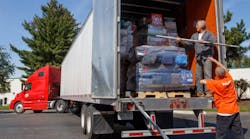The damage to infrastructure and oil refineries from Hurricane Harvey does not appear to have been as severe as initially feared.
But as freight shipments resume and recovery efforts continue in and around the Houston area, preparations are well underway throughout Florida for Hurricane Irma, expected to make landfall over the weekend.
“It is my understand the infrastructure recovery is happening fairly quickly,” Josh Brogan, vice president with global management consulting firm A.T. Kearney, told Fleet Owner.
He said the Port of Houston started moving containerized cargo on Sept. 4 for the first time since before the hurricane arrived.
Additionally, seven of the 14 oil refineries in the immediate area had resumed some level of operations, with others expected back before the end of the week. None of the facilities appear to have sustained catastrophic damage, Brogan said.
As for the land infrastructure, “major roads are up and running pretty well,” Brogan added. Freight railroads were actively working to repair tracks, with Union Pacific noting it was hoping to soon have the key intrastate Houston-to-Beaumont route running again soon.
Brogan said BNSF Railway was among the other companies working to restore service, though it has not been providing regular public updates.
Harvey’s effect on the spot market was immediately seen, according to DAT. The company reported the availability of spot truckload freight increased 2.9 percent for the week ended Sept. 2, while available capacity fell 4.3 percent.
Rates for van, flatbed, and reefer trucks all rose significantly, and “the rearrangement of supply chains, the difficulty of shipping in the flooded region, and a tightening spot market pushed rates higher on 78 of the top 100 van lanes in the country,” DAT said.
To assist with the overall recovery efforts, the Federal Motor Carrier Safety Administration eased regulations for truckers in more than half of states to help ensure there would not be fuel shortages. At the same time, truckers from all over the nation were involved in delivering relief supplies to Texas.
CIMC Intermodal Equipment said it was sending up to 600 new 40 foot gooseneck chassis to the Houston area for immediate replacement requirements due to flooding damage.
A.T. Kearney’s Brogan said the relief efforts could be tested by Hurricane Irma. As it began to appear inevitable Irma would hit Florida - and possibly other states - Brogan suggested it would better for the overall logistics network for the storm to remain in the Atlantic Ocean, as opposed to shifting toward the Gulf Coast.
By staying in the Atlantic, it would limit “the drain on the supply chain,” and allow for separate disaster and recovery efforts to continue after each storm. It would also make it less likely additional refineries would sustain damage.
Brogan was hopeful the advanced notice with Irma and the heightened awareness following Harvey would help limit the damage and speed the response after Irma passes.




